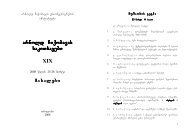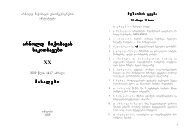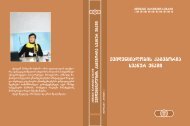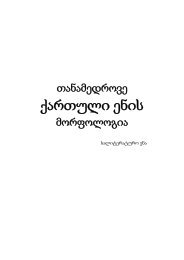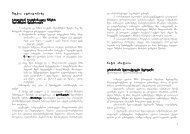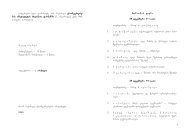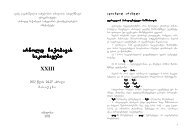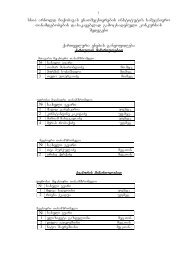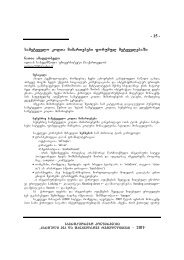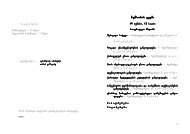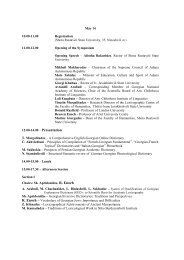5 r. a b a S i a (Tbilisi) bgeraTSesatyvisobis erTi rigisaTvis qarTvelur ...
5 r. a b a S i a (Tbilisi) bgeraTSesatyvisobis erTi rigisaTvis qarTvelur ...
5 r. a b a S i a (Tbilisi) bgeraTSesatyvisobis erTi rigisaTvis qarTvelur ...
Create successful ePaper yourself
Turn your PDF publications into a flip-book with our unique Google optimized e-Paper software.
In comparison with the archaic words, historical words don’t have competing<br />
equivalents-synonyms in the Lezgian language. This can be explained by<br />
the fact that the realities expressed by these terms are also out of time.<br />
To such words we can include some certain amount of terms. These<br />
words being out of usage, still are often used in belles-lettres style to describe<br />
life and culture, pictures and the plots of the historical events as well as the reflection<br />
of the lingual coloration of the past years: serder “head, master”; derviS<br />
“dervish”; Sihi “five-pence”; biger “social duty”; axun “mulla” (priest); vezir<br />
“councilor”.<br />
With the development of the new forms of social relations and change in<br />
social structure, the orientalisms which expressed the names of realities of<br />
ancient forms of governing of the country, became archaic and were transformed<br />
into categories of passively functioning ones. The old judicial, religious and<br />
financial terminology was transformed into the class of archaic words due to the<br />
changes in old establishments, titles and levels. In Lezgian language there are<br />
many Russian words which are not the names of new realities or things but<br />
which pushed away the borrowings from oriental languages. For example: judge<br />
(Arab. Cazi), secretary (Arab. Dibir), order (Arab. Shafaq´at), counter-revolutioner<br />
(Turk. Aksinq´ilabCi), list (Pers. sijah), slave (Pers. Muzdur), minister<br />
(Pers. Vezir), merchant (Pers. Bezirgan), hotel (Pers. Muhmanhana), army<br />
(Turk. quSut), doctor (Arab. hakim, tiebib), law (Aarab. qanun), state (Turk.<br />
paCadnG), holiday (Arab. m‘hduT, ruxsarT), seal (Pers. m‘h‘T), examination<br />
(Arab. Imtaghan), etc. These couples of words contain oriental borrowings<br />
which had become archaisms and they belong now to the passive layer of words<br />
in Lezgian, i.e. the words familiar to the Lezgian-speaking people, but which<br />
are not used by them in their every-day speech. They can be found in the literary<br />
works to emphasize the speech, to create special coloration of a high style<br />
poetic speech.<br />
After the end of the Caucasian war (1859), since the second half of the<br />
XIX century, the history of Russian-Daghestanian relations faces a new stage,<br />
most effective. This stage is characterized by noticeable development of trade,<br />
agriculture, handicrafts in Daghestan. The constructing of roads and later, railways<br />
in Daghestan had certain significance for economic and cultural develop-<br />
161



